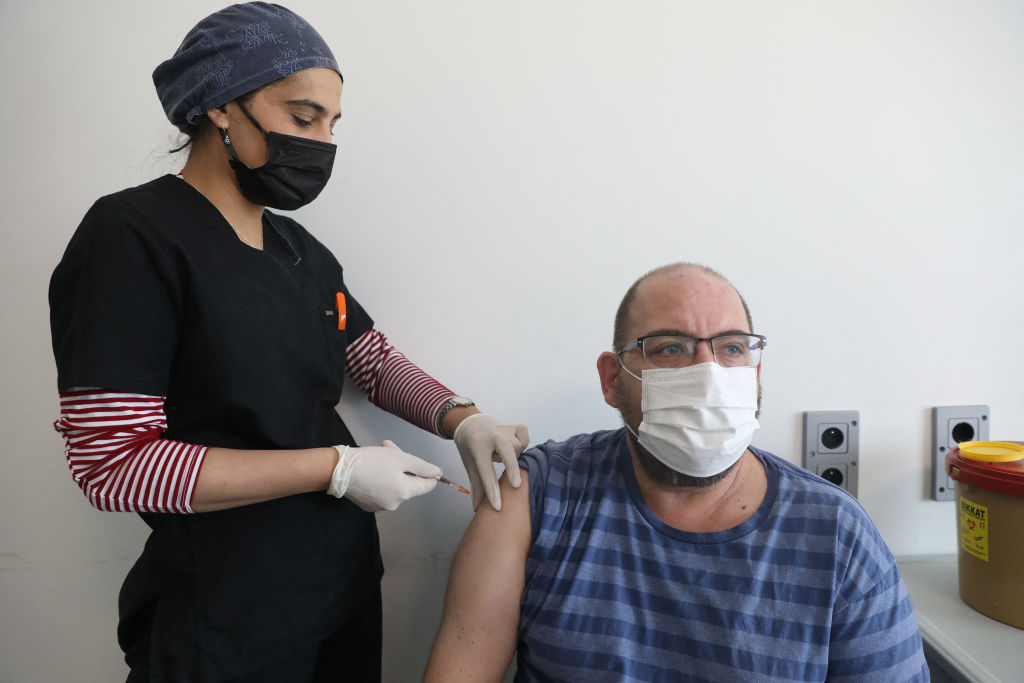Majority of Americans not planning to get vaccinated are 'unlikely to reconsider,' poll finds


A free daily email with the biggest news stories of the day – and the best features from TheWeek.com
You are now subscribed
Your newsletter sign-up was successful
A majority of those Americans who haven't yet been vaccinated against COVID-19 say they aren't likely to change their minds, a new poll has found.
In a Gallup poll released Monday, 24 percent of U.S adults said they don't plan to be vaccinated against COVID-19, compared to 60 percent who said they have already been fully vaccinated, four percent who have been partially vaccinated, and 12 percent who plan to be vaccinated. Of the adults who don't plan to be vaccinated, though, 78 percent said they are "unlikely to reconsider their plans," according to Gallup. This includes 51 percent who said they aren't "at all" likely to reconsider.
"That leaves one in five vaccine-reluctant adults open to reconsidering, with two percent saying they are very likely and 19 percent saying they are somewhat likely to change their mind and get vaccinated — equivalent to 5 percent of all U.S. adults," Gallup reports.
The Week
Escape your echo chamber. Get the facts behind the news, plus analysis from multiple perspectives.

Sign up for The Week's Free Newsletters
From our morning news briefing to a weekly Good News Newsletter, get the best of The Week delivered directly to your inbox.
From our morning news briefing to a weekly Good News Newsletter, get the best of The Week delivered directly to your inbox.
This poll comes less than a month ahead of the July 4 deadline that President Biden has set as a goal to get 70 percent of Americans vaccinated with at least one shot. But The Washington Post reported on Sunday that the U.S. is now averaging fewer than one million shots per day, down from 3.4 million a day in April, a pace that's "threatening" Biden's goal. But Gallup wrote that based on its poll, the goal may still be "within reach if half of the 12 percent planning to get vaccinated follow through, even if none of those not planning to get vaccinated change their mind." Gallup also wrote, though, that its data suggests "the ceiling on vaccination could be about 80 percent of U.S. adults."
Gallup's poll was conducted online by surveying a random sample of 3,572 adults from May 18-23. The margin of error is three percentage points. Read more at Gallup.
A free daily email with the biggest news stories of the day – and the best features from TheWeek.com
Brendan worked as a culture writer at The Week from 2018 to 2023, covering the entertainment industry, including film reviews, television recaps, awards season, the box office, major movie franchises and Hollywood gossip. He has written about film and television for outlets including Bloody Disgusting, Showbiz Cheat Sheet, Heavy and The Celebrity Cafe.
-
 The Olympic timekeepers keeping the Games on track
The Olympic timekeepers keeping the Games on trackUnder the Radar Swiss watchmaking giant Omega has been at the finish line of every Olympic Games for nearly 100 years
-
 Will increasing tensions with Iran boil over into war?
Will increasing tensions with Iran boil over into war?Today’s Big Question President Donald Trump has recently been threatening the country
-
 Corruption: The spy sheikh and the president
Corruption: The spy sheikh and the presidentFeature Trump is at the center of another scandal
-
 A Nipah virus outbreak in India has brought back Covid-era surveillance
A Nipah virus outbreak in India has brought back Covid-era surveillanceUnder the radar The disease can spread through animals and humans
-
 Trump HHS slashes advised child vaccinations
Trump HHS slashes advised child vaccinationsSpeed Read In a widely condemned move, the CDC will now recommend that children get vaccinated against 11 communicable diseases, not 17
-
 Covid-19 mRNA vaccines could help fight cancer
Covid-19 mRNA vaccines could help fight cancerUnder the radar They boost the immune system
-
 FDA OKs generic abortion pill, riling the right
FDA OKs generic abortion pill, riling the rightSpeed Read The drug in question is a generic version of mifepristone, used to carry out two-thirds of US abortions
-
 The new Stratus Covid strain – and why it’s on the rise
The new Stratus Covid strain – and why it’s on the riseThe Explainer ‘No evidence’ new variant is more dangerous or that vaccines won’t work against it, say UK health experts
-
 RFK Jr. vaccine panel advises restricting MMRV shot
RFK Jr. vaccine panel advises restricting MMRV shotSpeed Read The committee voted to restrict access to a childhood vaccine against chickenpox
-
 Texas declares end to measles outbreak
Texas declares end to measles outbreakSpeed Read The vaccine-preventable disease is still spreading in neighboring states, Mexico and Canada
-
 RFK Jr. shuts down mRNA vaccine funding at agency
RFK Jr. shuts down mRNA vaccine funding at agencySpeed Read The decision canceled or modified 22 projects, primarily for work on vaccines and therapeutics for respiratory viruses
